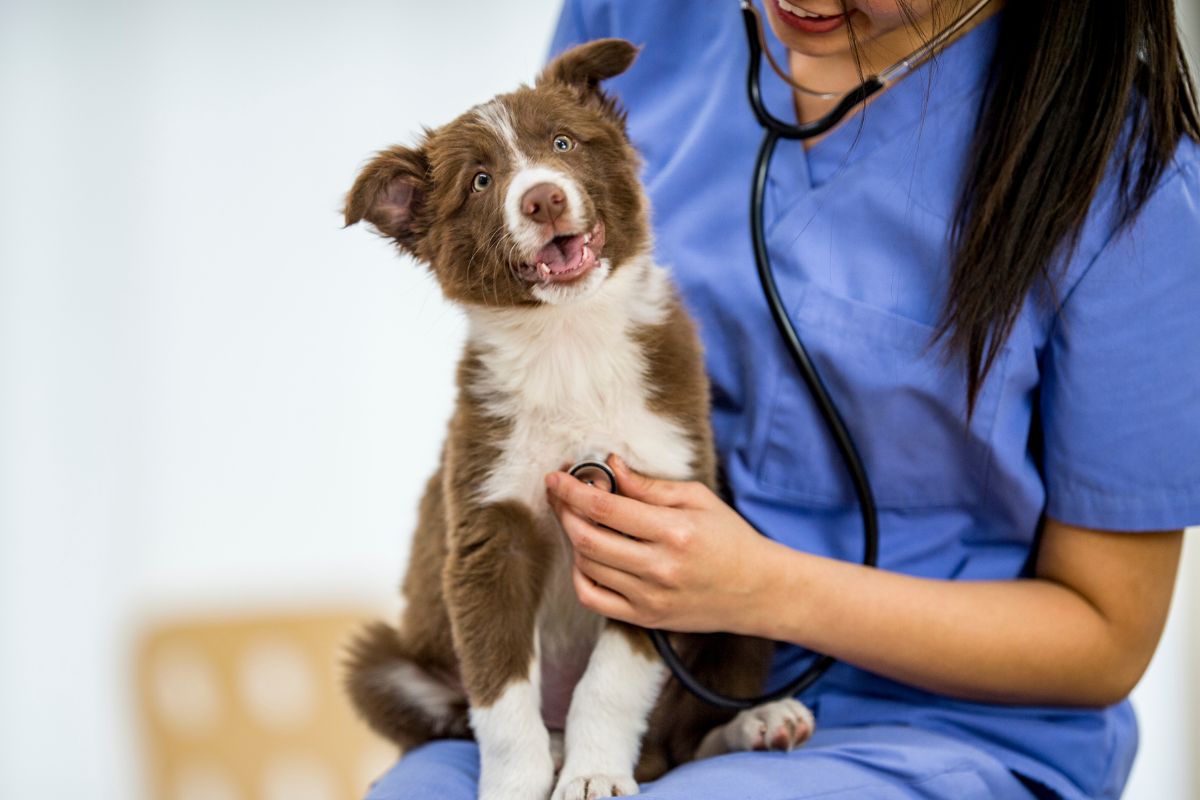Our furry companions, our dogs, are cherished members of our families, and their presence fills our lives with immeasurable happiness. Their wagging tails and playful antics bring laughter to our homes, and their unwavering loyalty warms our hearts. However, even the healthiest dogs can sometimes experience discomfort, such as vomiting. When this happens, it can be a source of deep concern and anxiety for pet parents who consider their dogs not just as pets but as beloved family members.
In this comprehensive guide, we embark on a journey to provide you with the knowledge and tools needed to ensure your canine companion’s well-being. We will explore in-depth what to do when my dog vomits, uncover the diverse causes of dog vomiting, delve into the underlying reasons why dogs vomit, and equip you with effective strategies on how to stop dog vomiting. Throughout this article, we will address these essential topics to help you navigate the challenges of canine health while ensuring your beloved furry family member remains in the best possible condition.
Understanding Why Dogs Vomit
Causes of Dog Vomiting
Dog vomiting can be triggered by a multitude of factors:
- Dietary Issues: One of the most prevalent causes of dog vomiting is dietary indiscretion. Dogs are known for their curious and sometimes indiscriminate eating habits. Sudden dietary changes or consuming spoiled food can lead to episodes of vomiting.
- Gastrointestinal Upset: Dogs may ingest items that are indigestible, such as grass, plastic objects, or small toys. These items can irritate the gastrointestinal tract, resulting in vomiting.
- Infections: Bacterial or viral infections can affect a dog’s stomach or intestines, leading to vomiting. These infections can be contracted from contaminated food, water, or exposure to infected animals.
- Motion Sickness: Just like humans, some dogs experience motion sickness during car rides. The combination of stress and motion can trigger vomiting in susceptible individuals.
- Toxic Ingestion: Ingesting toxic substances, such as chemicals, certain plants, or medications, can have severe consequences for dogs, including vomiting.
Normal vs. Abnormal Vomiting
Distinguishing between normal and abnormal vomiting is crucial:
- Normal Vomiting: Occasional vomiting may not be a cause for immediate concern. Dogs sometimes vomit to eliminate indigestible substances or excess food. This type of vomiting is usually self-limiting and resolves without intervention.
- Abnormal Vomiting: Frequent or severe vomiting should raise a red flag. If your dog vomits repeatedly within a short timeframe or exhibits additional concerning symptoms like lethargy, diarrhea, or abdominal discomfort, it’s time to take action.
Why Dogs Vomit
Understanding why dogs vomit is a crucial aspect of responsible pet ownership. While vomiting can be a distressing sight for any dog owner, it’s important to recognize that it’s a natural and protective mechanism that can serve various purposes in your dog’s overall health. In this section, we delve into the underlying reasons why dogs vomit, shedding light on this common but often misunderstood occurrence.
Indigestible Substances: Dogs are naturally curious creatures, and they often explore the world with their mouths. In the process, they might ingest items that are indigestible or irritants to their stomachs. When this happens, vomiting serves as a defense mechanism. It allows the dog to expel these foreign objects or substances before they can cause harm or blockage in the digestive tract.
Dietary Upsets: Changes in your dog’s diet can occasionally lead to digestive upsets. If you introduce new food abruptly or switch to a different brand without a gradual transition, your dog’s stomach may react by vomiting. This can also occur when your dog overindulges in treats or table scraps.
Gastrointestinal Infections: Bacterial or viral infections can wreak havoc on your dog’s digestive system. These infections can lead to inflammation of the stomach lining and intestines, causing vomiting as the body attempts to rid itself of harmful pathogens. It’s important to note that infections may be accompanied by other symptoms such as diarrhea, lethargy, or loss of appetite.
Motion Sickness: Just like humans, some dogs are prone to motion sickness. Car rides, boat trips, or even simply being in a moving vehicle can trigger nausea in sensitive dogs. Vomiting in such cases helps the dog expel the perceived threat, which is the motion that their body is not accustomed to.
Toxin Ingestion: Ingesting toxic substances is a severe issue that can lead to vomiting. Dogs may accidentally consume chemicals, poisonous plants, or medications that are harmful to their system. Vomiting serves as a rapid response to eliminate these toxins from the body. If you suspect your dog has ingested something toxic, seek immediate veterinary attention.
Regurgitation vs. Vomiting: It’s important to distinguish between regurgitation and vomiting. Regurgitation is a passive process where undigested food or liquid is expelled from the esophagus without much effort or retching. Vomiting, on the other hand, is an active process involving abdominal contractions and forceful expulsion of stomach contents.
What to Do When Your Dog Vomits
Assess the Situation
When your dog vomits, follow these steps:
- Stay Calm: Dogs can pick up on your emotions, so remaining calm is essential to reassure your pet.
- Examine the Vomit: Take note of the vomit’s color, consistency, and any unusual contents. This information can be valuable when discussing the issue with your vet.
- Check for Other Symptoms: Observe your dog for any additional signs such as diarrhea, lethargy, or abdominal pain.
Temporary Food Fast
To help your dog’s stomach settle, consider a temporary fasting period:
- Withhold Food: Avoid feeding your dog for 12-24 hours.
- Provide Water: Ensure your dog has access to clean water to prevent dehydration. Encourage small, frequent sips.
Gradual Food Introduction
After the fasting period, reintroduce food gradually:
- Bland Diet: Start with a bland diet, such as boiled chicken and rice, in small portions.
- Monitor Response: Keep a close eye on your dog’s reaction to the food. If vomiting recurs, consult your veterinarian.
Monitor Your Dog
Continuously monitor your dog’s condition:
- Observe Improvement: If your dog’s vomiting subsides and they appear to be improving, you can gradually transition back to their regular diet.
- Seek Veterinary Advice: If vomiting persists or worsens, or if your dog’s overall condition deteriorates, it’s crucial to consult a veterinarian promptly.
How to Prevent Dog Vomiting
Proper Diet and Nutrition
A well-balanced diet tailored to your dog’s specific needs can go a long way in preventing vomiting episodes. Ensure you:
- Choose Quality Food: Select high-quality dog food that meets your dog’s dietary requirements.
- Avoid Sudden Changes: Gradually transition to a new food to minimize digestive upset.
Supervision and Training
Supervising your dog during outdoor activities and proper training can prevent them from ingesting harmful items:
- Supervise Playtime: Keep an eye on your dog during play, especially if they tend to pick up objects.
- Training: Teach “leave it” and “drop it” commands to discourage your dog from consuming non-food items.
Regular Vet Check-ups
Regular check-ups with your veterinarian can help identify and address potential health issues before they escalate:
- Scheduled Visits: Stick to a regular vet visit schedule as recommended by your veterinarian.
- Discuss Diet: Consult with your vet about your dog’s diet and any necessary adjustments.
When to Visit the Vet
Persistent Vomiting
If your dog vomits frequently within a short period, it’s a clear cause for concern. This persistent vomiting can lead to dehydration and other health complications.
- Dehydration: Frequent vomiting results in fluid loss, potentially leading to dehydration, which can harm your dog’s overall health.
- Electrolyte Imbalances: Persistent vomiting can disrupt essential electrolyte balances, affecting nerve and muscle function.
- Nutritional Deficiencies: Vomiting prevents nutrient absorption, potentially causing weakness and malnutrition.
- Underlying Health Issues: Frequent vomiting may indicate underlying health problems, necessitating veterinary attention.
Blood in Vomit
The presence of blood in your dog’s vomit is a significant cause for alarm and demands immediate veterinary attention. This red flag may indicate various underlying issues, ranging from internal injuries to ulcers or more severe conditions that require urgent medical intervention.
Possible Causes of Blood in Vomit
When blood is present in your dog’s vomit, it’s essential to consider potential causes:
- Gastrointestinal Ulcers: Gastrointestinal ulcers can develop in the stomach or the lining of the intestines. These ulcers can result from various factors, including stress, certain medications, or infections. The erosion of the ulcerated tissue can lead to bleeding, which manifests as blood in the vomit.
- Ingested Foreign Objects: Dogs are known for their curiosity and sometimes ingest non-food items. Sharp or abrasive objects can damage the lining of the digestive tract, leading to bleeding. This is particularly concerning as it may lead to blockages or perforations.
- Toxic Ingestion: The ingestion of toxic substances can have severe consequences, including gastrointestinal bleeding. Certain chemicals, plants, or medications can damage the stomach lining, resulting in blood in the vomit.
- Trauma or Injury: Physical trauma or injury to the abdomen can cause internal bleeding. This could be the result of accidents, falls, or even blunt force trauma. Internal bleeding can be life-threatening and requires immediate attention.
Why Blood in Vomit Requires Urgent Veterinary Attention
The presence of blood in your dog’s vomit is a clear indication that something is seriously amiss. Here’s why immediate veterinary attention is crucial:
- Potential Severity: Blood in vomit can signify a range of conditions, some of which are severe or life-threatening. Prompt diagnosis and treatment are essential to address the underlying issue effectively.
- Pain and Discomfort: Dogs experiencing gastrointestinal issues with bleeding can be in significant pain and discomfort. Timely intervention can alleviate suffering and prevent further complications.
- Risk of Anemia: Chronic bleeding, if left untreated, can lead to anemia in dogs. Anemia is a condition characterized by a shortage of red blood cells, resulting in weakness and fatigue.
- Complications: Untreated bleeding can lead to complications such as shock or organ damage. Early diagnosis and treatment can mitigate these risks.
Seeking Immediate Veterinary Care
If you observe blood in your dog’s vomit, it’s critical not to delay seeking veterinary care. Here’s what you should do:
- Contact Your Veterinarian: Call your veterinarian immediately to describe the situation and receive guidance on the next steps.
- Do Not Administer Medications: Avoid giving your dog any over-the-counter medications without professional advice, as this can worsen the condition.
- Monitor Your Dog: Keep a close eye on your dog’s overall condition, including changes in behavior, appetite, and energy levels.
Other Alarming Symptoms: Pay attention to additional concerning symptoms:
- Diarrhea: Frequent, severe, or bloody diarrhea.
- Lethargy: Unusual tiredness or weakness.
- Abdominal Pain: Signs of discomfort or pain in the abdominal area.
- Behavioral Changes: Sudden shifts in behavior, such as aggression or withdrawal.
Prolonged Vomiting
Prolonged vomiting, lasting more than 24 hours, is a significant concern in dogs and requires immediate veterinary attention. This persistent symptom can signal various underlying health issues, including:
- Gastrointestinal Blockage: A life-threatening condition where a foreign object obstructs the digestive tract.
- Gastroenteritis: Inflammation of the stomach and intestines, often due to infections or dietary issues.
- Pancreatitis: Inflammation of the pancreas, causing severe abdominal discomfort.
- Organ Dysfunction: Issues with vital organs like the liver or kidneys.
- Infectious Diseases: Viral or bacterial infections, such as parvovirus, can lead to severe vomiting.
Prolonged vomiting can lead to dehydration, electrolyte imbalances, nutritional deficiencies, and secondary complications. Swift veterinary intervention is crucial. Your vet will conduct an examination, recommend diagnostic tests, and develop a tailored treatment plan, which may include medications, fluid therapy, and dietary adjustments.
Recognizing the seriousness of prolonged vomiting and seeking prompt veterinary care is essential for your dog’s well-being.
Our canine companions enrich our lives with their unwavering loyalty and affection. When they vomit, it’s a signal that something may be wrong. By following the comprehensive guidance provided in this article, you can take proactive steps to address your dog’s vomiting episodes, whether they are minor or necessitate professional intervention.
It’s important to remember that this article offers general advice and should not replace the expertise of a qualified veterinarian. If you ever find yourself uncertain about your dog’s health or if their condition deteriorates, don’t hesitate to reach out to a veterinary professional. Your diligence and care are instrumental in ensuring your beloved furry friend enjoys a healthy and happy life.










